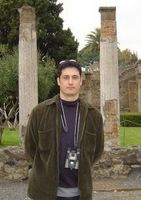User created content.
I worked in the Internet/High Tech Industry throughout the glory years of the dotcom era and web 1.0. I left that world in 2001 when that world fell apart.
Here we are five years later, Web 2.0. A lot has changed regarding the Internet in the last 5 years. The biggest change of all of course has been the paradigm shift in who creates content.
In Web 1.0 it was media companies, retailers, corporations and advertising agencies who created the content that we absorbed.
Now almost all of the biggest success stories online over the last five years have some kind of user generated content or user edited content at their core. Blogs, Ebay, Myspace, Facebook, Youtube and Google among them. I guess that is why TIME made US the "People of the Year."
It has empowered people around the world in numerous ways from politics, to entertainment, from self expression to commerce.
All that being said though, what has not changed very much is that there are still "aggregators" and "gatekeepers" who determine what music is recorded, what books are published, which paintings are shown, which movies are made and what news is widely distributed. Both on and off-line.
Web 2.0 has definitely put a dent in the ability of the gatekeepers to completely dominate what is or is not produced and consumed. Some will argue that the gatekeepers are quite needed and always will be. It is impossible for people to wade through the millions of possibilities on their own.
In other words we are not quite in a user-generated content world quite yet.
It makes me think about our blog friend "bookfraud." A good man trying to get his good novel published.
Looking at this week's New York Times Best Seller List, its not hard to see why it is so hard for talented writers top get past the gatekeepers. It's the same writers, from the same publishing houses, largely writing the same books over and over again who get the money and support for their work.
1FOR ONE MORE DAY, by Mitch Albom. (Hyperion, $21.95.) A troubled man gets a last chance to reconnect and restore his relationship with his dead mother.
2 NEXT, by Michael Crichton. (HarperCollins, $27.95.) The author of ÂJurassic Park describes a not-too-distant future when genetic engineering runs amok.
3 CROSS, by James Patterson. (Little, Brown, $27.99.) Alex Cross, retired from the F.B.I., has a chance to track a rapist who may have murdered his wife.
4 DEAR JOHN, by Nicholas Sparks. (Warner, $24.99.) An unlikely romance between a soldier and an idealistic young woman is tested in the aftermath of 9/11.
5* TREASURE OF KHAN, by Clive Cussler and Dirk Cussler. (Putnam, $27.95.) In his 19th adventure, Dirk Pitt confronts a murderous Mongolian tycoon who manipulates the oil market and knows the secret of Genghis Khan .
6 HANNIBAL RISING, by Thomas Harris. (Delacorte, $27.95.) The childhood and adolescence of Hannibal Lecter shed light on how he became ÂdeathÂs prodigy.Â
7 BROTHER ODD, by Dean Koontz. (Bantam, $27.) With his ability to see the spirits of the dead, Odd Thomas, a character in two previous novels by Koontz, heads off a catastrophe at a monastery .
8 NATURE GIRL, by Carl Hiaasen. (Knopf, $25.95.) A single mother takes revenge on her lecherous ex-boss and an annoying telemarketer in the Florida Keys. 8 4
9* WILD FIRE, by Nelson DeMille. (Warner, $26.99.) Detective John Corey and his wife, an F.B.I. agent, help to foil a nuclear plot against the United States. 7 5
10 LISEY'S STORY, by Stephen King. (Scribner, $28.) A widow's journey through grief after the death of her husband, a famous novelist with terrible memories. First Chapter
11 THE SHAPE SHIFTER, by Tony Hillerman. (HarperCollins, $26.95.) Lt. Joe Leaphorn, a tribal detective, tracks down an antique Navajo rug with a complicated history.
12 THE BOLEYN INHERITANCE, by Philippa Gregory. (Touchstone/Simon & Schuster, $25.95.) Politics and treachery in the court of Henry VIII, narrated by three women, two of them his sometime wives.
13 SANTA CRUISE, by Mary Higgins Clark and Carol Higgins Clark. (Scribner, $22.) Passengers on a Christmas cruise for charity, including an amateur sleuth, manage to foil two escaping felons.
14 THIRTEEN MOONS, by Charles Frazier. (Random House, $26.95.) A man raised in the North Carolina wilderness travels America in defense of his adopted Indian people and broods over an elusive woman.
15* FIRST IMPRESSIONS, by Nora Roberts. (Silhouette, $17.95.) Seeking peace, a wealthy businessman retreats to a small town, but his lovely and charitable neighbor won't stay away; reprint of a 1984 novel.
That is simply amazing. All of these authors are in one way or another "fiction machines" who have mastered the art of formulaic and familiar stories and prose styles. They are "brands." And lets face it, in a hyper-consuming country like ours, brands sell.
You can see the same pattern in the film industry, music business, in the mainstream news media and in the fine arts.
So we are the people of the year, primarily because we have all become content creators as well as consumers.
That is fine and well but the balance of power still lies with the aggregators and gatekeepers. It will be interesting to see how that balance changes in the NEXT five years.


